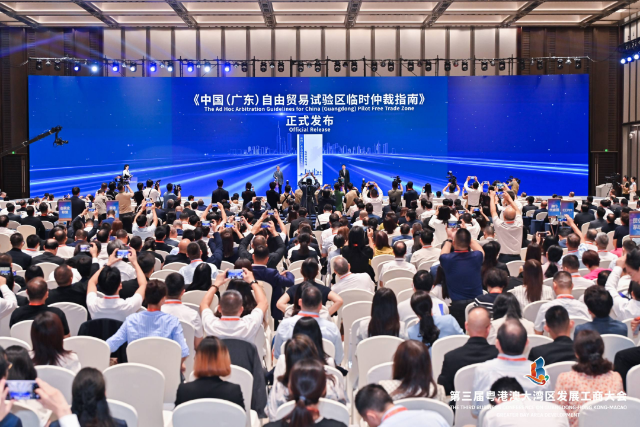On September 15, the 3rd Business Conference on Guangdong-Hong Kong-Macao Greater Bay Area (GBA) Development opened in Guangzhou, drawing over 1,200 representatives from government agencies, business sectors, and industry associations across 30 countries and regions.
Under the theme "Empowering the Greater Bay Area for New Opportunities," the event featured in-depth discussions on cross-border financial integration, commercial legal frameworks, artificial intelligence innovation, and biomedical industry development.
A report on GBA supply chain promotion was revealed during the event, highlighting how the enhanced supply chain framework is creating new opportunities for industrial collaboration and corporate innovation across the GBA.

The conference also released a comprehensive guide that systematically outlines the legal basis, procedural rules, and key considerations for Chinese and foreign enterprises to resolve disputes through ad hoc arbitration in the China (Guangdong) Pilot Free Trade Zone.

Regional integration
Since the Outline Development Plan for the GBA was released in 2019, seamless cross-region infrastructure—including high-speed rail networks, world-class port systems, and unified digital connectivity platforms—has been rapidly established, accelerating the free flow of talent, capital, and data across the region.
"We've witnessed seamless cross-region medicine circulation, patients traveling between Hong Kong, Guangzhou, and Shenzhen for treatment, and talent mobility across the region," highlighted Roberta Lipson, Founder of United Family Healthcare, regarding the GBA's advancements in medical cooperation.

Natalie Kwok, Senior Vice President of Invest Hong Kong, introduced standardized contracts for data flows between GBA cities and Hong Kong. "This simplifies personal information transfers for businesses, enhancing regional digital collaboration."
Choi Kin-wa, Executive Director of Macau-Union Pharmaceutical, revealed that Macao's traditional Chinese medicine registration in Guangdong is now supported by Guangdong-Macao Pharmaceutical Co., Ltd. in the Guangdong-Macao Traditional Chinese Medicine Science and Technology Industrial Park in Hengqin.
"Two drug certificates have been issued, with three to four new approvals expected this year," he stated.
Emerging sectors and global partnerships
According to the latest report released by the World Intellectual Property Organization (WIPO) this year, the Shenzhen-Hong Kong-Guangzhou innovation cluster has surpassed the Tokyo-Yokohama cluster to rank first globally.
As of 2024, the GBA is home to 22 Fortune Global 500 companies, 70 unicorn startups, and over 70,000 national-level high-tech enterprises.
"The market scale and ecosystem components in the GBA are globally unparalleled," stated Noah Fraser, Senior Vice President for China Operations at the US-China Business Council.
"Its highly integrated commercial ecosystem serves as both a laboratory and a training ground, enabling companies to test innovative concepts, refine business models, and successfully scale operations across the Chinese market and into global arenas," Fraser believes.
"The GBA is emerging as Asia's hub for medical tourism and global biomedical research breakthroughs." Lipson revealed that her institution plans to expand hospitals in Shenzhen and Guangzhou to attract international patients.

Victor Queiroz, Chief Representative of the Asia-Pacific Region of ApexBrasil, emphasized the GBA's logistics advantages. "Brazilian companies can leverage the GBA's ports, airports, and innovation hubs to promote mutual trade."
"Our recent direct shipping route from Brazil to Zhuhai Port cuts voyage time by 15 days and reduces costs by 15%." Queiroz also announced Shenzhen's new representative office to boost Sino-Brazilian trade in digitalization, green technologies, and cross-border e-commerce.
Reporter | Chen Jinxia
Cameraman | Zhao Zijie
Video Editor | Zeng Xiangxing
Photo | China Council for the Promotion of International Trade Guangdong Committee
Editor | Hu Nan, James Campion, Shen He
















